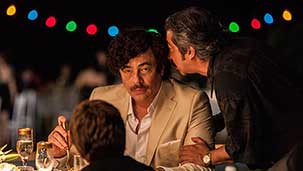I’d like to think you’re good at your job. I really would. As you already know, Benicio Del Toro is known for disappearing into his roles, and portraying real-life drug kingpin Pablo Escobar in Escobar: Paradise Lost must have meant many long hours of research for you. At least, I think it did.
Unfortunately, there’s not a whole lot of your work on display in Andrea Di Stefano’s debut feature film. Even though Escobar’s name is in the title, Di Stefano has instead chosen to focus on the fictionalized love story of a Canadian ex-pat who falls for Escobar’s niece and becomes caught up in the chaos surrounding the final days of the infamous Colombian’s drug empire.
As Nick, Josh Hutcherson continues the long, sad tradition of fictional white characters tasked with helping a white audience acclimate to an unfamiliar foreign world. This decision is a little depressing in that it perpetuates the notion that an audience can only relate to characters that look like them. But it’s made worse by the fact that Hutcherson brings exactly two notes to his performance: lovestruck (happy) and worried (less happy). To be fair, I can’t lay all the fault at his feet, as Di Stefano’s script doesn’t give him much to do beyond that. The theme Di Stefano is trying to establish is one of blind love; a man unwittingly pulled into terrible events. The actual result is character who just seems sort of stupid. While attending a lavish birthday party for Escobar, NIck asks his true love where all the money comes from. She answers simply, cheerfully, “Cocaine!” Hutcherson expresses brief worry, but quickly shifts back to his puppy-love face. Not long after, he tells his brother that Escobar is “not as bad as everyone says.” You start feeling that whatever Hutcherson’s character has coming is his own damn fault.
As a plot structure, that isn’t necessarily a bad thing. If the young lovers burned brightly enough, we’d believe that he’d ignore all the warning signs just to be with her. But it doesn’t. Claudia Traisac, as Nick’s beloved Maria, is about as broadly sketched as he is: pretty and nice and selfless (she works with the poor!). Did I mention pretty? As a screen couple, they do a lot of talking about being in love without ever actually showing it. If Di Stefano wants us to see them as as a drug-era Jack and Rose heading towards a Pablo Escobar-shaped iceberg, he plotted his course all wrong.
Maybe the idea was that you and Del Toro would create such a magnetic presence in Escobar that everyone, including the audience, would be drawn to him. I can’t say for sure, because little of that ended up onscreen. Like the romance, there’s a lot of talk about how beloved Escobar is – he’s referred to as “Papa Escobar” by the poor – but we don’t get much evidence beyond that. An early speech given by Escobar hints at his charisma, but the camera is more interested in focusing on the dopey white boy scanning the crowd for the sexy Latina. He looks everywhere but the stage. This scene might as well play as a metaphor for the experience of watching Escobar: Paradise Lost. Hutcherson is that too-tall concert-goer standing right in front of you, blocking your view of the performer you actually want to see. If he’d just move out of the way, you might enjoy yourself.
It’s s shame, because there’s an early scene that shows how the work you did with Del Toro might have brought the film to life. After Escobar’s birthday party, Nick is paid a late-night visit by the man himself. Escobar is basically feeling him out to see if he’s a worthy suitor for his niece, but in the course of their conversation, the young man mentions some local thugs giving him and his brother a hard time. Silently, Escobar takes a pen out of his pocket and jots a note on his palm. Nothing is said, but we all know it’s bad news for those thugs. It’s a small moment, but it demonstrates, powerfully, the way fates are decided in the smallest of moments. As the talk winds down, Escobar says, “This was good conversation.” He’s right: it’s a genuinely interesting scene. I just wish that when Escobar left the room, the camera had followed him instead.
Sincerely,

Casey







